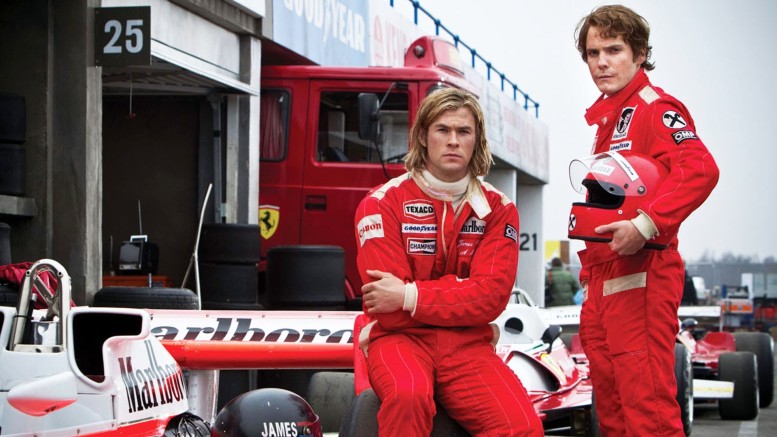Back in 2005, Ron Howard directed the criminally-underrated boxing film Cinderella Man which surprisingly struggled at the box-office (though it rightfully earned its place as one of this critic’s all-time favourite films!). Several years on, the Happy Days actor-turned Oscar-winning filmmaker has returned to the sports genre with his exhilarating racing car drama Rush. Given the recent success of the BAFTA-winning documentary Senna (2011), Formula One is starting to gain credibility on the big screen as Howard chooses to set his new film on the sporting feud between racers James Hunt and Niki Lauda. Throw in some fast-paced racing scenes and the casting of promising actors Chris Hemworth and Daniel Bruhl and you have a film with plenty of rev and firepower.
SYNOPSIS: In 1970, playboy British driver James Hunt (Chris Hemsworth) finds himself outwitting Austrian racer Niki Lauda (Daniel Bruhl) during a Formula Three race. Bitter about the defeat, Lauda decides to buy his way into Formula One racing and ends up driving for Ferrari which then leads to Hunt signing up for McClaren. Six years later, the pair compete in the F1 Championship but when they get to the German Grand Prix, tragedy strikes when Lauda gets embroiled in a ferocious crash that leaves him with severe burns. Whilst recovering in hospital, he vows to return to the racing circuit in order to prevent his fiercest rival from becoming world champion.
As was the case with Cinderella Man, Howard chooses to centre his film more on the human drama than with the sporting thrills that were advertised efficiently in the trailers. This will come as good news to non-Formula One fans although it does enable them to learn more about the sport especially when we get to the intense racing scenes. Focusing on the sporting side first, it is through those adrenaline-filled sequences that the film authentically succeeds as the production team excel in portraying the gloomy 1970s through the use of groovy costumes and a grainy camera setting. The latter is pulled off impressively by cinematographer Anthony Dod Mantle as he captures the fast-flowing spectacle of the differing races while bringing a visual touch to each country that the Grand Prix takes place e.g. Brazil – hot and humid, Germany/Japan – wet and dull. The race scenes are further bolstered by the crisply-cut editing and rely on loud pieces of sound mixing to give you the empowering feel that you’re right in the thick of it even before the games are about to begin. Hans Zimmer also makes a welcoming return to the music side as the renowned composer brings elements of his associated score to the film as well as using classy 70s songs to capture the musically-brilliant era. However the more important aspect of the film is the focus on its two central characters as Howard makes the inspired decision to cast two actors who both ironically share similar factors to the men they portray on screen. As the high-profile star of blockbusters like Thor and The Avengers, Chris Hemsworth continues to show promise as one of the best young actors around with his role as the reckless and ambitious James Hunt, who always showed a thirst for winning as well as being the George Best of racing when it came to pursuing women. In stark contrast, we have Daniel Bruhl, a talented yet undiscovered actor (best known for his small role in Quentin Tarantino’s Inglorious Basterds) who manages to overshadow his more flamboyant co-star with his portrayal of the well-mannered if flawed opponent Niki Lauda. Both characters are total opposites in terms of personality but as the film goes on, they end up learning the values of each other and that they are putting their lives on the line when it comes to the sport they love. This comes into context in one ‘get-in-there’ scene where Hunt beats up an insensitive journalist for making harsh comments about Lauda’s new appearance. It may be cheesy but it makes you celebrate justice being done. Solid support to the two main stars also comes from the likes of American actress Olivia Wilde as Hunt’s model wife Suzy Miller (complete with an impeccable British accent) and an emotionally-affective Alexandra Maria Lara as Lauda’s loyal spouse Marlene.
However the chief flaw for Rush is that it does suffer from occasional lapses of poor script-work which is a surprise when you have an experienced and dedicated screenwriter like Peter Morgan on your team. Having produced riveting writing for the two leads of Howard’s previous film, Frost/Nixon (2008), he is unable to build as much tension between the two leads here other than to have the characters trade childish insults with each other particularly through some strange dialogue. This also causes problems with Hunt’s backstory as straight from the outset, we see him as this beastly lothario who lacks any background with regards his dogged personality. The final problem with Howard’s films is the lack of focus on his female characters especially in the case of the two men’s wives as well as the lovely Nurse Gemma (a wasted Natalie Dormer). The latter star is involved in the opening love-making scene with Hunt yet after one race, she disappears and isn’t seen again. Margery Tyrell would not approve of this treachery!
VERDICT: While it may lack the emotional brilliance of Senna, Ron Howard delivers once again with his fast and furious take on one of sport’s greatest rivalries and is aided well by the exceptional performances of his two main stars and the film’s authentic look.


Be the first to comment on "Rush – ★★★★"